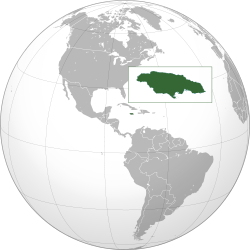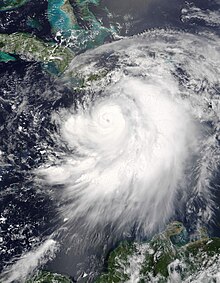The Jamaica Portal
Jamaica (/dʒəˈmeɪkə/ ⓘ jə-MAY-kə; Jamaican Patois: Jumieka [dʒʌˈmie̯ka]) is an island country in the Caribbean Sea and the West Indies. At 10,990 square kilometres (4,240 sq mi), it is the third largest island—after Cuba and Hispaniola—of the Greater Antilles and the Caribbean. Jamaica lies about 145 km (90 mi) south of Cuba, 191 km (119 mi) west of Hispaniola (the island containing Haiti and the Dominican Republic), and 215 km (134 mi) south-east of the Cayman Islands (a British Overseas Territory). With 2.8 million people,0 Jamaica is the third most populous Anglophone country in the Americas (after the United States and Canada), and the fourth most populous country in the Caribbean. Kingston is the country's capital and largest city. Most Jamaicans are of Sub-Saharan African ancestry, with significant European, East Asian (primarily Chinese), Indian, Lebanese, and mixed-race minorities. Because of a high rate of emigration for work since the 1960s, there is a large Jamaican diaspora, particularly in Canada, the United Kingdom, and the United States. The country has a global influence that belies its small size; it was the birthplace of the Rastafari religion, reggae music (and such associated genres as dub, ska and dancehall), and it is internationally prominent in sports, including cricket, sprinting, and athletics. Jamaica has sometimes been considered the world's least populous cultural superpower. (Full article...) Selected article -Reggae (/ˈrɛɡeɪ/) is a music genre that originated in Jamaica in the late 1960s. The term also denotes the modern popular music of Jamaica and its diaspora. A 1968 single by Toots and the Maytals, "Do the Reggay", was the first popular song to use the word reggae, effectively naming the genre and introducing it to a global audience. While sometimes used in a broad sense to refer to most types of popular Jamaican dance music, the term reggae more properly denotes a particular music style that was strongly influenced by traditional mento as well as by American jazz and rhythm and blues, and evolved out of the earlier genres ska and rocksteady. Reggae usually relates news, social gossip, and political commentary. It is instantly recognizable from the counterpoint between the bass and drum downbeat and the offbeat rhythm section. The immediate origins of reggae were in ska and rocksteady; from the latter, reggae took over the use of the bass as a percussion instrument. Reggae is deeply linked to Rastafari, an Afrocentric religion which developed in Jamaica in the 1930s, aiming at promoting pan-Africanism. Soon after the Rastafarian movement appeared, the international popularity of reggae music became associated with and increased the visibility of Rastafari and spread its gospel throughout the world. Reggae music is an important means of transporting vital messages of Rastafari. The musician becomes the messenger, and as Rastafari see it, "the soldier and the musician are tools for change." (Full article...)Did you know (auto-generated)
Selected biography -
Kenneth George Boothe OD (born 22 March 1948) is a Jamaican vocalist known for his distinctive vibrato and timbre. Boothe achieved an international reputation as one of Jamaica's finest vocalists through a series of crossover hits that appealed to both reggae fans and mainstream audiences. (Full article...)
General images -The following are images from various Jamaica-related articles on Wikipedia.
This is a Good article, an article that meets a core set of high editorial standards.
In early July 2005, Hurricane Dennis brushed Jamaica, bringing torrential rain and damaging floods to the island nation. Forming from a tropical depression on July 4, Dennis began impacting Jamaica three days later. Approximately 6,000 people evacuated from coastal and flood-prone areas prior to the storm's arrival while relief agencies allocated resources for recovery operations. Passing northeast of the island, impact from Dennis stemmed primarily from rainfall—accumulations peaked at 24.54 in (623 mm) and reached 1-in-50 year event levels. Widespread flooding and landslides damaged homes and isolated communities. Saint Thomas and Portland Parishes were hardest-hit; hundreds required evacuation as multiple rivers burst their banks. Overall, 209,000 people were affected with 6,000 households requesting assistance. A week after Dennis, Hurricane Emily brought further rain to the island, exacerbating damage. Their combined effects damaged or destroyed 440 homes with total losses reaching J$5.976 billion (US$96.87 million), of which at least J$2.128 billion (US$34.5 million) can be attributed to Dennis alone. One person died due to flooding. Relief operations began before the hurricane subsided, and international communities provided further aid. The overall effects of Dennis were limited and the nation's economy sustained no major ramifications. (Full article...)Selected picture -Selected cuisines, dishes and foods -Roots wine more commonly known as "roots drink" or "herbal drink" is a type of medicinal beverage popular in Jamaica. It is believed to have healthful and aphrodisiacal qualities for men. Roots wine is made from a variety of herbs and roots, often blended with honey or molasses. It is naturally fermented and slightly effervescent, typically containing less than 5% alcohol. (Full article...)
More did you know
Selected listsTopicsCategoriesRelated portals
WikiProjectsGeographical:
History and Society:
Tasks
Associated WikimediaThe following Wikimedia Foundation sister projects provide more on this subject:
More portals | ||||||||||






















































